‘Indelicate, Ungenteel, Vulgar & Outrageous Women’
June 5th – July 6th 2023
An exhibition exploring a new order of social justice then and now
Josephine Butler College Durham University
South Road
Durham, DH1 3DF
Indelicate,
Ungenteel,
Vulgar &
Outrageous Women
Indelicate. Ungenteel. Vulgar. Outrageous.
Such was the verdict which the friends of Elizabeth Pease and Josephine Butler passed on their campaigns for social justice. These four adjectives cast Butler, Pease and such other female activists as Harriet Martineau and Anna Murray Douglass as women who transgressed the boundaries of femininity. The words reveal the potential of campaign work to disrupt not only a social issue, but gendered expectations of behaviour – and seek to shame those who undertake such work into stopping it.
Yet instead of retreating into silence, Pease, Butler, Martineau, Murray Douglass and others raised their voices and carried out actions which spoke louder than words. Battling against ill health, personal adversity and the loss of time to domestic duties or the need to financially support husbands and families, these women came up with ingenious ways to advance their campaigns. They wrote letters, attended meetings, published work and utilised religious connections to build and maintain networks of national and international importance, but also made use of their immediate surroundings to great effect. From turning the family home into the headquarters for the Underground Railroad to opening the Darlington Mechanics Institute, they exerted monumental influence on the movements for the abolition of slavery and female emancipation.
While there is little doubt that these women shaped history, they are not always recognised as doing so, and it is this wrong which the ‘Indelicate, Ungenteel, Vulgar & Outrageous Women’ exhibition seeks to help to right. Curator Philip Gatenby was invigilating an exhibition at Darlington’s Crown Street Gallery when he began to read about the influential Pease family. With his interest piqued by social reformer Elizabeth Pease, Gatenby tried to find out more about her, only to discover that there was very little information available. What began as a research trip to Edinburgh which focused on Pease soon snowballed into an investigation into other women who campaigned for social justice. Looking beyond the nineteenth century, Gatenby discovered other attempts at the erasure and silencing of women who fought to effect social change – and the idea for an exhibition was born.
‘Indelicate, Ungenteel, Vulgar & Outrageous Women’ explores a new order of social justice and foregrounds women who engaged in radical acts of non-resistance. It traces a line from nineteenth-century women of and from the North East of England, to those active around the world in the 1930s, 1960s and 1990s. From abolitionists to musicians, from suffragists to artists, the exhibition celebrates women skilled in activism, advocacy and original thinking. It highlights the importance of Quaker, anti-slavery and art school networks to the pursuit of social justice, but also, crucially, acknowledges the importance of the domestic sphere in laying the foundation for activism in the next generation. Whether making the decision to highly educate their daughters or use photography to document inequality, the women featured in this exhibition demonstrate the variety of places and spaces in which social justice can be pursued.
Curated as a series of “trigger points” as opposed to a solely didactic installation, ‘Indelicate, Ungenteel, Vulgar & Outrageous Women’ features a range of commissioned work which carries the campaign for social justice into the present day. Contemporary film from Tereza Stehlikova, a Pip Dickens painting, a photo essay by Claire Gray and print work from Alec Gatenby combine with framed Jo Spence photography and National Portrait Gallery prints to trace a new order of social justice from the past to the present. You are encouraged to read, watch, observe and reflect upon the materials, and forge your own connections between “then” and “now”. It is hoped that you will leave the exhibition not only with a greater awareness of the lives of some remarkable women, but also a desire to research your ideas further – and to begin to work towards effecting the sort of social justice that you would like to see.
Dr Louise Powell
Writer in Residence 2023
Josephine Butler College, Durham University
June 19th 2023, at two weeks into the exhibition, here are some collected thoughts with accompanying photos from our curator, Phil Gatenby.

Many thanks to all at the 8th June opening, having a look, taking time, making a memory. On the wall behind: Jo Spence work from the NPG collection courtesy of Richard Saltoun Gallery (image left), Tereza Stehlikova screening ‘Between Jiřina and Anna’ (middle) and New York Times 2013 ‘Art in Review’ feature Jo Spence: ‘Work (Part III) the History Lesson’. The wall out of picture on the right is the next post.

This exhibition, perhaps any and all visual art exhibitions, offer an opportunity to experience stillness. To take a moment for ourselves and give a moment, a time for looking a wee bit longer, in this instance at a commissioned work made by Claire Grey explicitly for this show titled: ‘Grey Ladies’ – a family lineage, a photo-work about then and now.
This is also a moment to reimagine our own families, the quiet ones, the lucky ones and the ones that made a fuss.
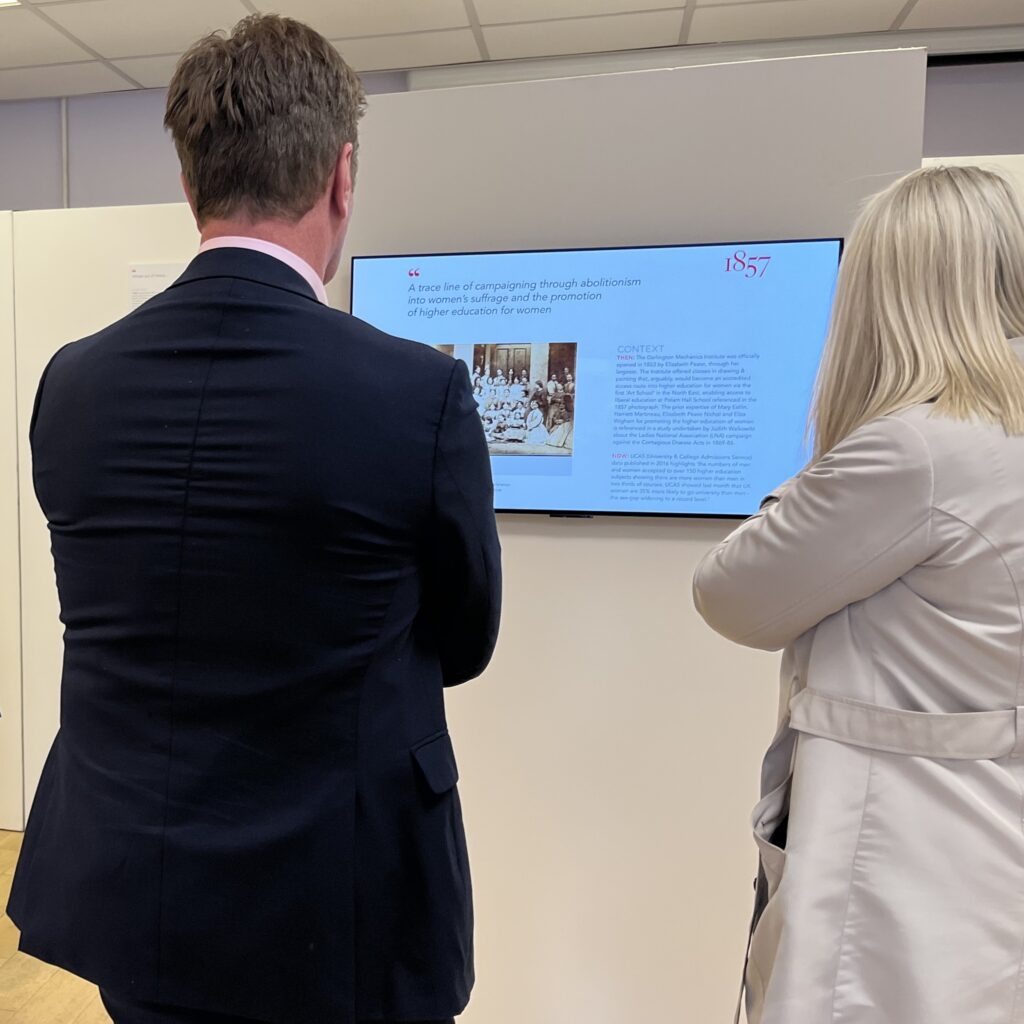
‘Indelicate, Ungenteel, Vulgar & Outrageous Women’ is a public exhibition. You can see paintings, portraits and photographs from the National Portrait Gallery (NPG) Primary Collection; film screenings of video work made by Tereza Stehlikova in Prague and get to know about 1960s rebel activist Marta Kubišová, a guest speaker at the primary school Tereza attended way back when.
The TV screen, by chance, shows what can be argued to be the first opportunity for women to attend an accredited art school education in the UK… in Darlington.
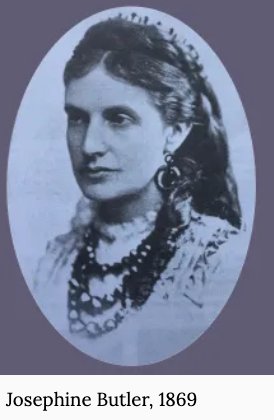
This exhibition is about remarkable people at a time when exhausting oppression legitimised the abuse of women through legal statutes. The Contagious Diseases Acts. It took 22 years to repeal these acts and the lead activist against this injustice was Josephine Butler. IUVOW protest is alive and well in the here and now.
‘After the 1869 Social Sciences congress at which the CD Acts were raised and condemned, a number of individuals established the National Association for the Repeal of the CD Acts. No women were originally included in the organisation though many later joined. The result of this omission was that by the end of December, the Ladies National Association for the Repeal of the Contagious Diseases Acts was formed. On New Year’s Day 1870, one of their first actions was to publish in the Daily News a protest against the Acts. This was signed by 124 women including Florence Nightingale, Josephine Butler, Mary Carpenter, Lydia Becker and drafted by Harriet Martineau and became known as the Ladies’ Protest.’
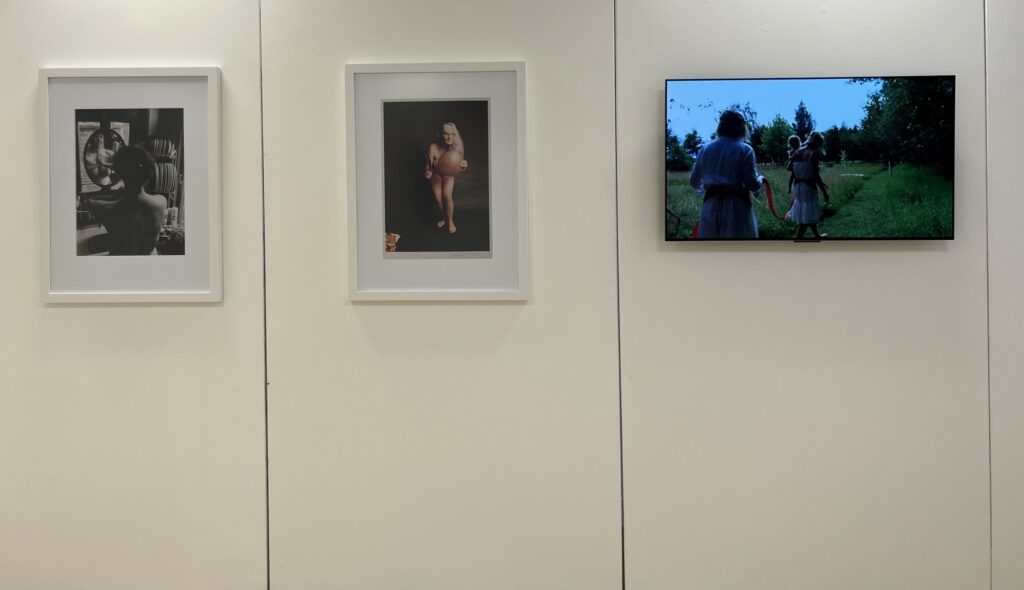
Shown to the right is a work from Tereza Stehlikova, the screen you can see here in situ is so wonderfully sharp and clear, visitor response to the connectivity of her family narrative is heartening to hear. The show has guests visiting whose family culture is variously situated. Iraq, India, Ukraine and across the UK. Such a pleasure to discuss the work of DOX in Prague City. The exhibition held recently at DOX: ‘The Pain of Others’, finished May 23rd really did cross the bridge. The visual alliance with Jo Spence as Warrior Woman is well made. Thank you.
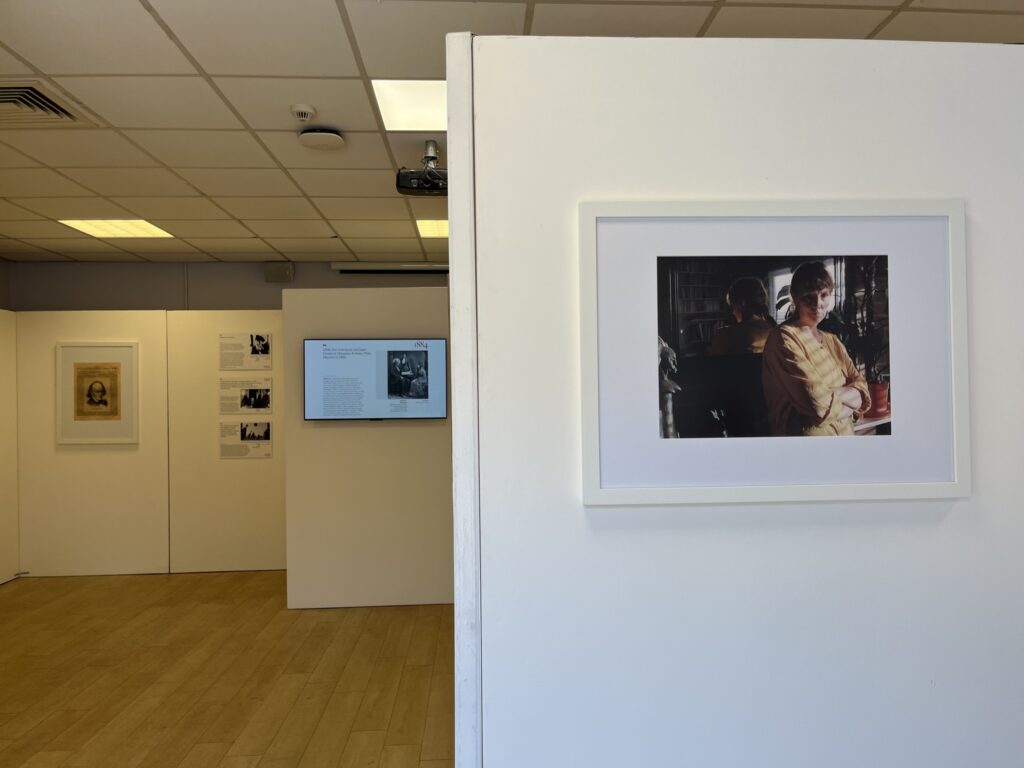
Many thanks to Ann McGuiness for taking this photograph of Jo Spence in 1989. A treasure. Heartening to know the National Portrait Gallery includes this compelling work in their Primary Collection. Well done to both, it matters.
The image above welcomes visitors and guests into the ‘Indelicate, Ungenteel, Vulgar and Outrageous Women’ exhibition space. Visitors are immediately in the frame, invested and can do no other than dare to enter.
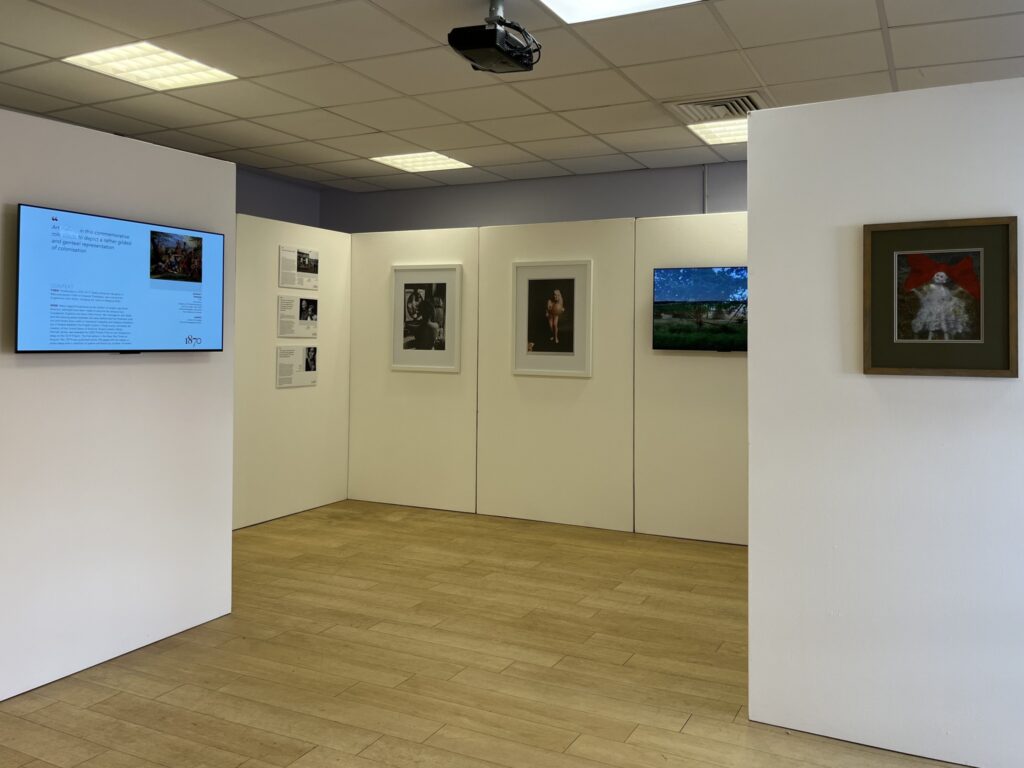
Pip Dickens you are a star. Your painting titled ‘Girl With a Red Bow’ (image right) is such a joy. Visitors and guests get it. It really crosses the bridge. Well done to you.
The image above shows the way the work is presented in situ, a chronology guiding viewers and guests to acknowledge the narrative of the show starts with a painting made in 1840 and ends with a painting made now, in this moment.
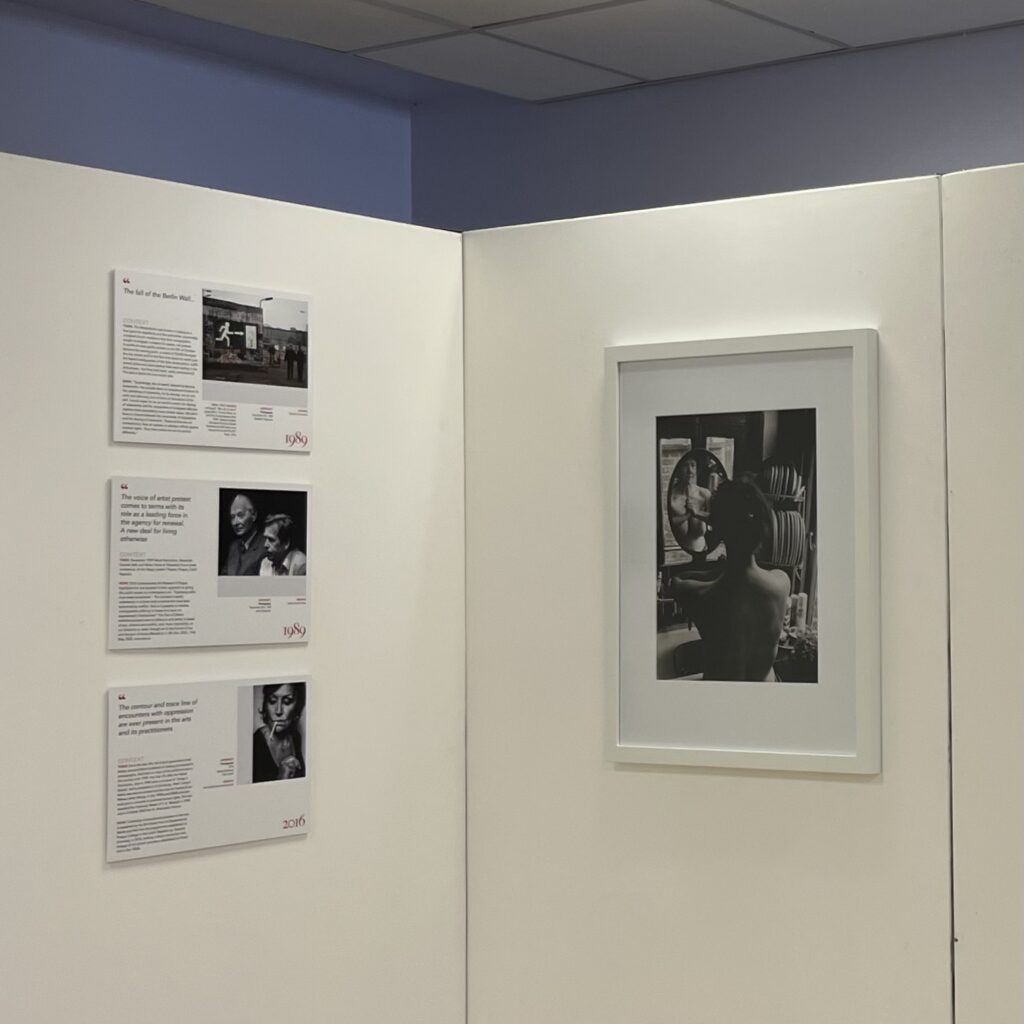
A refreshed look at 1989, decades ago, the fall of the Berlin Wall, the Velvet Revolution in Prague (Dubcek and Havel) including an especially welcome accolade for Marta Kubišová (image left) alongside a photograph of Jo Spence from the National Portrait Gallery, Primary Collection, taken by Maggie Murray (image right) – images of trust, each in their own way, quite remarkable and humbling.